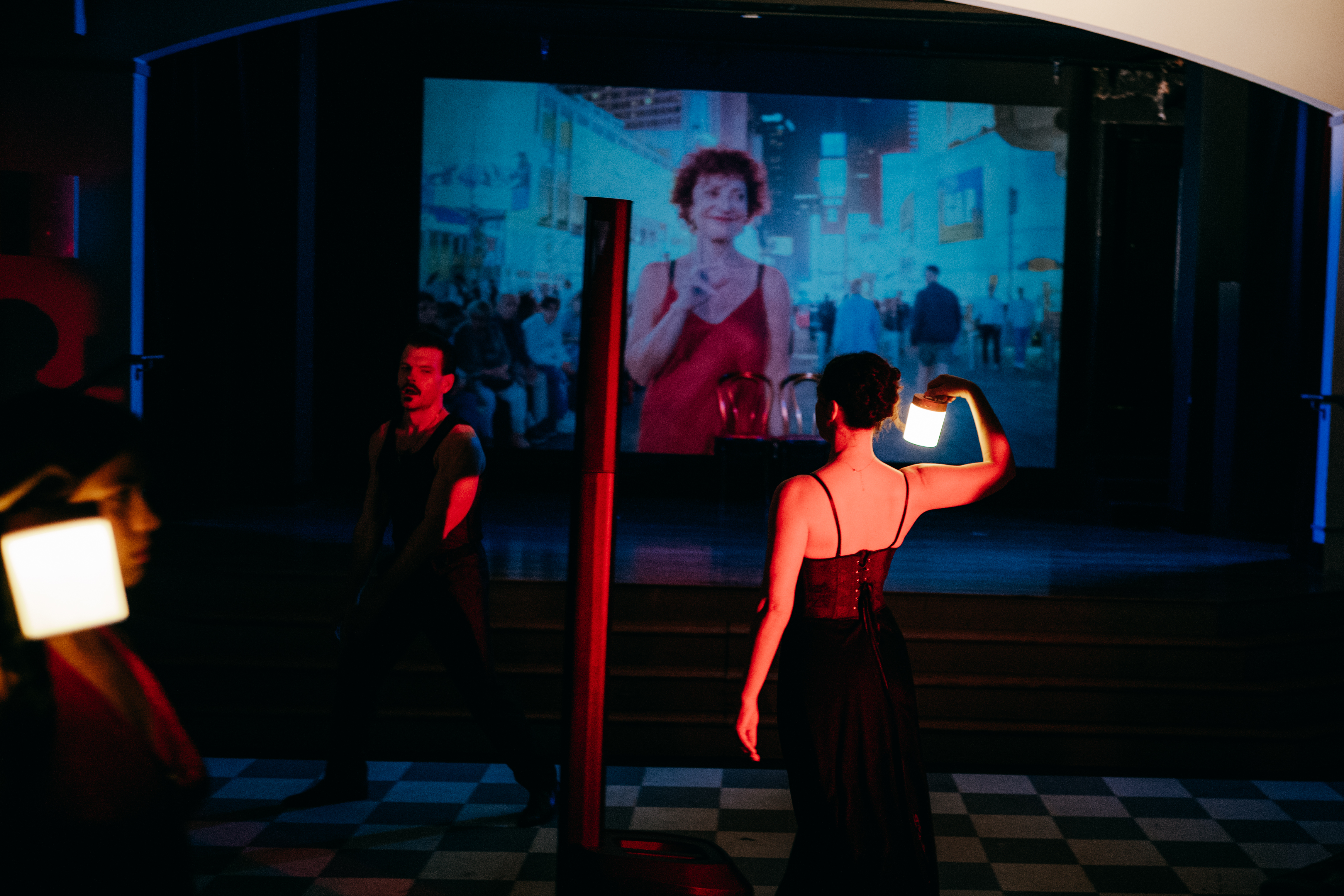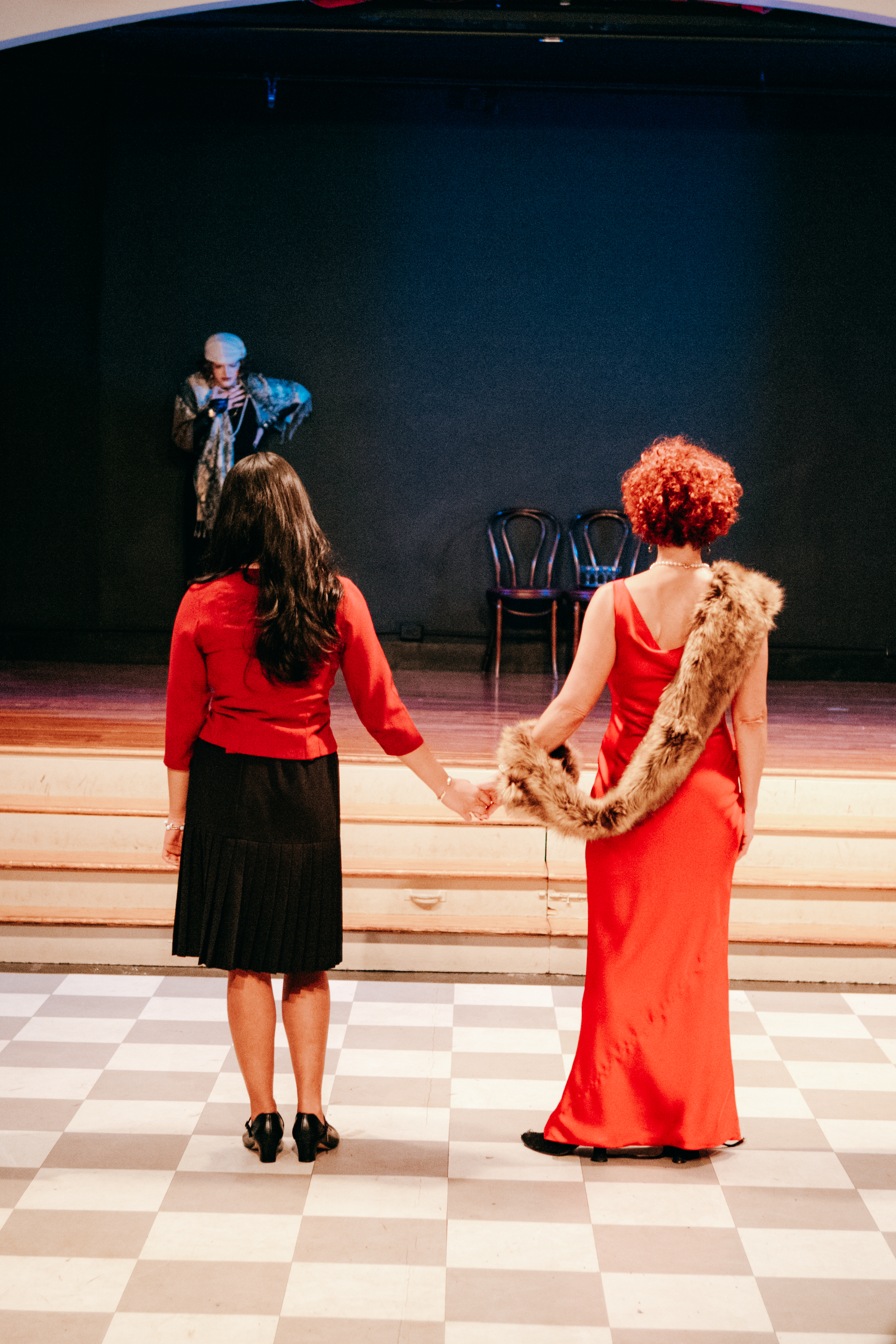
Adult Film’s production of The Cherry Orchard. Photo by Geve Penaflor.
Off-Off Dispatch: From a Cherry Orchard to Trinity to Trinity
Two plays, reviewed: a bawdy ensemble cast and an intimate one-woman show.
By Claire Tumey
10.3.2025
Before seeing Adult Film’s production of Anton Chekhov’s The Cherry Orchard, one must climb up five flights of stairs (well, there’s also an elevator at Rutger’s Presbyterian Church, where the contents of this classic tale of inheritance, dalliance, and nostalgia are presented in impish juxtaposition). As I climbed, the faint sounds of “Reptilia” by The Strokes lured me higher, sharpening into full sonic immersion as I entered a space that immediately brought back memories of every Protestant Church lock-in I ever went to in middle school (I grew up Catholic, but it was common knowledge that the Protestants were the ones with the cool lock-ins).
“Time goes by… so slowly…” provocateur and chanteuse for the ages Madonna sings at the top of her (underrated) 2005 hit “Hung Up,” which director Ryan Czerwonko has chosen to usher us into the story of Lubov, her family, her associates and servants, and her eponymous cherry orchard. From there, we enter a world that seemingly transcends time. In this slightly abstracted take on a classic early-20th-century play, time speeds up, slows down, reverses, freezes, and diverges. Czerwonko–who also plays Lophakin, the son of a serf-turned-eventual owner of Lubov’s old estate–has made a feast of the interpersonal and broader social politics at hand in this farcical tragicomedy.
The plot is relatively straightforward: a Russian aristocrat returns to her homeland from an extended reprieve abroad, only to learn that the family estate is being sold at auction to pay a defaulted mortgage. Adult Film describes their interpretation as “a fast-paced sex comedy that finds itself not in an orchard or a nursery, but on a dancefloor–a ballroom of the mind.” The company has been developing this production of The Cherry Orchard for over a year, and their hard work clearly shows. The performances are lived in–intoxicatingly believable and painstakingly nuanced. The actors find their strongest footing in Czerwonko’s meticulous choreography of relationships, weaving into and out of and between one another in moments of stylized physical comedy as well as blink-and-you’ll-miss-it internal struggles (the latter of which Chekhov is widely known for). John Christopher Jones’s translation is adroit without ever indulging in pretentious loftiness, and is adequately suited for Czerwonko’s desired fast pace. Accompanying the live theater, all the while, are elements of pre-recording and live filmography constructed by tech artistry duo Case & Porter.

Adult Film’s production of The Cherry Orchard. Photo by Geve Penaflor.
I’ve witnessed several companies incorporate live feed filmography in the past several years to varying degrees of success. Here, Adult Film successfully uses live feed and dreamlike, arthouse-adjacent video sequences, both to exhibit the ephemeral beauty and hedonistic glamour of Lubov’s memories–playing into the consuming and stunting power of nostalgia–and offer a nod to our own digital era, a time far from the initial context of this play and where our fleeting memories are concretized, even surveilled, by the ubiquitous nature of post-post-modern internet culture. The late translator John Christopher Jones was able to act in the production himself, playing the eccentric, senile, retired manservant and representative of the old guard, Firs, who appears only in video. While his lack of physical presence made him slightly less memorable in my mind than the other characters who were featured digitized and in the flesh, perhaps there’s something to be said about witnessing Firs’s rambling, muttering monologues delivered without the opportunity for dialogue, his visage projected larger than life, fixed in time without any hope or even possibility of change.
Megan Metrikin’s Lubov commanded attention without ever forcing it, exuding natural sexuality and an aristocratic poise that held just enough charm to lure one into sympathizing (a little) with her fall from power. Czerwonko, as Lophakin, expertly restrained a Barry Keoghan-in-Saltburn-esque volatility that seemed to always be bubbling under the surface of his quest to take Lubov’s place; he hubristically–and satisfyingly, theatrically speaking–falls prey to the forces of materialistic desperation and paranoia that once put him and his father on the losing end of the aristocracy’s consolidation game. Magnetic and idiosyncratic, Lauren Guglielmello was wholly devoted to her mantle as the emotional center of the play: Varya, Lubov’s adopted daughter and the overworked manager of the estate. It’s a large cast, each part with its own starmaking moments and a well-rehearsed synchronicity that constellate to form what I consider to be the greatest achievement a scrappy independent theater company can muster: an ensemble show with truly evenly distributed load-bearing responsibility.

Adult Film’s production of The Cherry Orchard. Photo by Geve Penaflor.
While I am deeply fond of and exhilarated by bawdy, large-cast offerings like Adult Film’s The Cherry Orchard, I also hold a special place in my heart for theater that lands on the other end of the spectrum: intimate solo shows. Two years ago, I took a solo show of my own around various theaters in New York and, finally, to the Edinburgh Fringe, and it was the hardest thing I’ve ever done. I feel a subsequent sense of camaraderie and respect for creators who dare to take the stage with little else but the power of their own storytelling talent and are able to successfully engage an audience; Amaterasu Za’s From Trinity to Trinity, starring Ako (God Said This, Shogun), was no exception to my deeply held sentiments.
Amaterasu Za is a theater company focused on uplifting bilingual theater artists and exploring classic and contemporary Japanese works for Japanese and English-speaking audiences. From Trinity to Trinity is a theatricalization of Japanese author Kyoko Hayashi’s pilgrimage to the Trinity nuclear testing site in northern New Mexico. Hayashi was one of the hibakusha, the name designated for people who survived the atomic bombings of Hiroshima and Nagasaki in August 1945. She was only 14 years old, a student worker at a munitions plant, when the sun “turned red and lost its rays” and Nagasaki–her school, her friends, her home–was obliterated by the American atomic bomb. Hayashi endured and persevered through years of radiation sickness and psychological distress and trauma until, at age 69, she sought to “know about America by seeing it with [her] own eyes.” In the span of 45 minutes, Lucille Lortel-nominated actress Ako takes us on this pilgrimage with her, telling Hayashi’s thought-provoking, poetic, emotional, and enlightening story with an obvious reverence for and command of the complexity implicit in it.
 Ako in
Amaterasu Za’s
From Trinity to Trinity. Photo by Russ Rowland.
Ako in
Amaterasu Za’s
From Trinity to Trinity. Photo by Russ Rowland. The production, like the Trinity site, is bare: beyond projected images as well as a handful of light cues and pre-recorded voiceovers, we rely on the script and Ako’s voice to conjure the striking and evocative imagery of Hayashi’s writing. Conjure she does; Ako understands and acutely mines the deep well of meaning behind Hayashi's encounters with various circles and cycles of life and death, her connection with nature and its ability to call forth cherished memories, and her at-times humorous interactions with Americans and their culture. The author’s connection to Georgia O’Keefe–her exploration of the ties that connect the life and work of that revered artist to the monstrous human capacity for destruction made manifest in August 1945–was a particularly strong element of the show for me and will likely stay with me for a very long time. I grew up with a lot of Georgia O’Keefe artwork in the house–my mother loved O’Keefe, an affinity I’m sure she developed while our family lived in New Mexico for a time. I wonder if my mother, if Georgia, if Kyoko, felt at peace in the solitude of that expanse of land and sky, ever looked out over the Rio Grande and felt security in the knowledge that nature, to quote Hayashi herself, is “not always gentle, but it is never malicious.”
I was grateful to Ako, Amaterasu Za, and From Trinity to Trinity for reminding me about the beauty of solitude and remembrance as well as the power of honest, vital storytelling. After the play, I sat in the backyard of my favorite bar, listening to the sounds of a free jazz duo amble out from inside and leaning back in my chair, awash in the chatter from the French people to my right and the gentle fall of light rain on my face. I wasn’t on my phone or thinking about the next thing or the next play or the next deadline; perhaps the spirits of Hayashi and O’Keefe were there with me, nudging forth a little reminder to cultivate my ability to simply witness.


Left: Adult Film’s production of The Cherry Orchard. Photo by Geve Penaflor.
Right: Ako in Amaterasu Za’s From Trinity to Trinity. Photo by Russ Rowland.
The Cherry Orchard runs at Rutgers Presbyterian Church weekends until October 12.
From Trinity to Trinity runs at HERE Arts Center until October 5.
